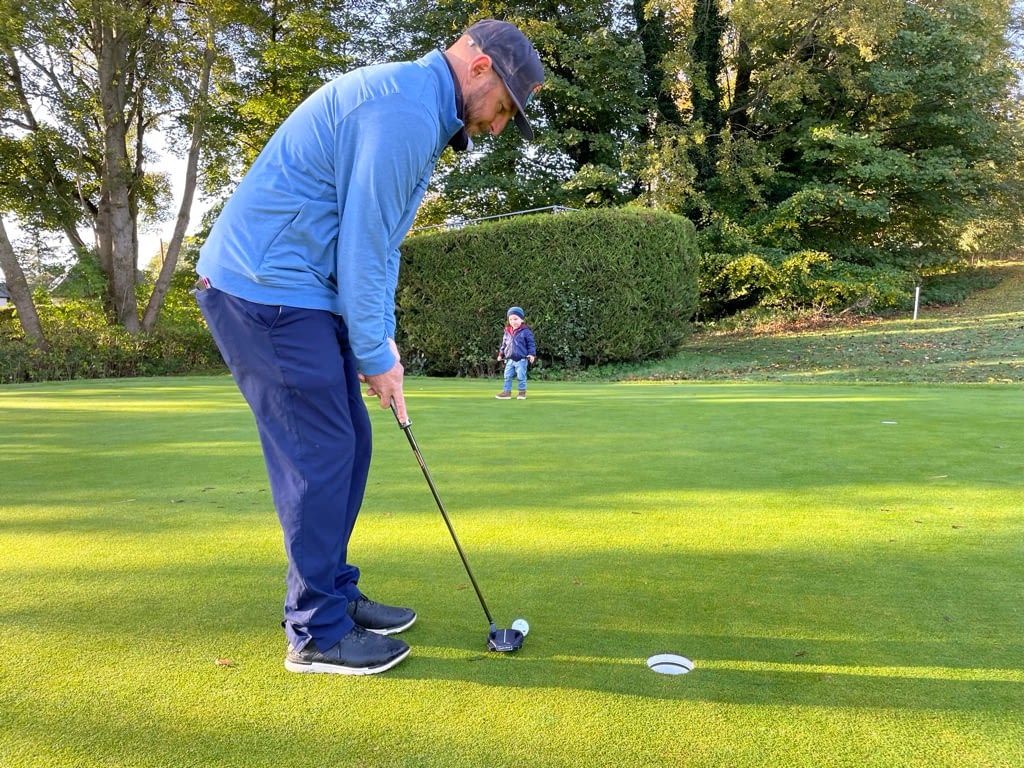
Jack Whittaker stands on the first tee, eyes focused on the fairway that stretches out before him. The soft morning light casts long shadows across the grass, and the familiar scent of fresh-cut turf fills the air. He’s here, on the course, not just for the game but for a far more personal reason. Golf has become his arena for self-improvement, a place where he can test his mental strength, challenge the remnants of his addiction, and confront the patterns of negativity that once ruled his life. Today’s round is more than just about lowering his handicap. It’s a battle for his mind.
As Jack prepares to swing, the familiar pressure begins to mount. He’s no stranger to self-doubt. Twelve years of sobriety have taught him how to face his demons, but the old habits, the old thoughts, still linger in the corners of his mind. “You’re not good enough for this,” a voice whispers, just as it has so many times before. “You’ll never be the player you want to be. Just give up now.”
In that moment, Jack pauses. He’s learned to listen to that voice—not with the intent to obey it, but to recognize it for what it is. It’s an old pattern of thinking, the same mindset that nearly destroyed him before he got sober. But now, it has no power over him unless he gives it that power.
He breathes in deeply, letting the air fill his lungs, and exhales slowly. He focuses on the present, tuning out the negative noise. The golf swing is his anchor, a way to ground himself in the here and now. “I’ve worked hard to get here. I can handle this.” With a calm and deliberate motion, Jack takes his shot. The ball soars down the fairway, and though it’s not a perfect strike, it’s enough to calm his nerves. He’s learned to celebrate the small victories, the moments when he chooses to rise above the negativity instead of sinking into it.
On the third hole, Jack faces a challenge. The fairway narrows, and the green is tucked behind a sand trap, surrounded by thick rough. His mind begins to race. The familiar sense of pressure mounts as he prepares for a difficult approach shot. He’s hit the sand too many times, and the anxiety starts to creep in. “What if I mess this up? What if I hit another bad shot? I don’t belong here.”
But this time, Jack has a strategy. He’s been here before. He knows that the key to managing his mental game is not fighting the thoughts, but simply acknowledging them and choosing not to act on them. He can’t control every shot, but he can control how he reacts to them. In the past, he would’ve spiraled into frustration, letting one bad shot dictate the rest of the round. But today, he stops, steadies himself, and focuses on what’s in front of him.
“This is just one shot. It doesn’t define me. I’m not here to be perfect. I’m here to get better.” Jack repeats this mantra to himself, over and over, until it drowns out the negativity. He steps into the shot with a clear mind, adjusting his stance and approach with purpose. The ball clears the sand, landing on the green with a soft thud. It’s not the perfect approach, but it’s a good one—one that gets him in a position to save par.

It’s a small victory, but it feels monumental to Jack. Each time he catches himself before sinking into self-doubt, he’s building a new foundation, one that’s based on compassion and patience instead of harsh criticism. He’s learning to separate himself from his mistakes, to see them as opportunities for growth rather than evidence of failure.
On the back nine, the stakes feel higher. The pressure to finish strong starts to mount, and Jack’s thoughts begin to turn inward again. “You’ve made it this far, but can you really handle the rest? Are you strong enough to keep going? Maybe you should just stop and quit now.”
But Jack knows better. He’s learned the value of pushing through discomfort, of leaning into the struggle instead of avoiding it. When his mind starts to race, when the pressure feels like it’s going to overwhelm him, he returns to his breath. He focuses on the rhythm of his body, the way his hands grip the club, the feeling of the earth beneath his feet. He remembers what Eastern philosophy has taught him: that all things, even the most uncomfortable moments, are temporary. “This is just a moment. It doesn’t define me. I can let it go.”
By focusing on the present, Jack isn’t allowing the negative thoughts to control him. He’s creating a space where the mind is calm, even in the face of difficulty. It’s in these moments of stillness that Jack finds his greatest strength. It’s not the power of his swing that matters most—it’s the power of his mind, the ability to choose a positive thought, to focus on progress instead of perfection.

On the 16th hole, Jack finds himself in a tough position. The tee shot has left him deep in the rough, and there’s water guarding the green. His mind flares with anxiety. “You’ve had enough of these tough shots today. Why keep pushing?” The old patterns of thinking threaten to take hold, but Jack doesn’t let them. He doesn’t push them away, either—he simply observes them, knowing they have no power over him. Instead, he refocuses, drawing on the lessons he’s learned from both sobriety and golf.
“This is just another challenge. It’s okay to be nervous. I’m going to do my best, and that’s enough.” He takes a moment to clear his mind, to shift his focus from the outcome to the process. With a smooth, controlled swing, the ball arcs through the air and lands just short of the green, setting him up for an easy chip shot. It’s not perfect, but it’s exactly what he needed in that moment.
The final hole approaches, and Jack is still in the zone, a place where the game is no longer about scorecards or comparison. It’s about being in the present moment, about honoring the process rather than fixating on the results. As he lines up his final putt, the past and future fade away. There is no room for negativity, no space for doubt. All that matters is the next stroke.
Jack sinks the putt. The round is over, but the victory feels sweeter than any scorecard could reflect. He’s not just walking off the course with a lower score—he’s walking off with a deeper sense of accomplishment. He’s learning to forgive himself, to embrace his flaws as part of his growth. Every shot, every breath, every thought is an opportunity to change the way he views himself.
As he heads back to the clubhouse, Jack’s thoughts are clear and calm. “I’m enough. I’m always enough.” He knows that the real work isn’t about perfecting his swing or lowering his handicap—it’s about learning to navigate the landscape of his mind, to find peace and progress, even in the face of challenges. And today, he has done just that.
Jack’s journey, both in golf and in life, is about continually choosing the path of self-compassion. Every round is a chance to refine not only his game but his mindset. And with each victory—no matter how small—he’s reminded that the battle isn’t just won on the course, but in his mind. And in that victory, Jack finds his greatest strength.
At Golf Ball Wisdom we can help you get where you want to be.
